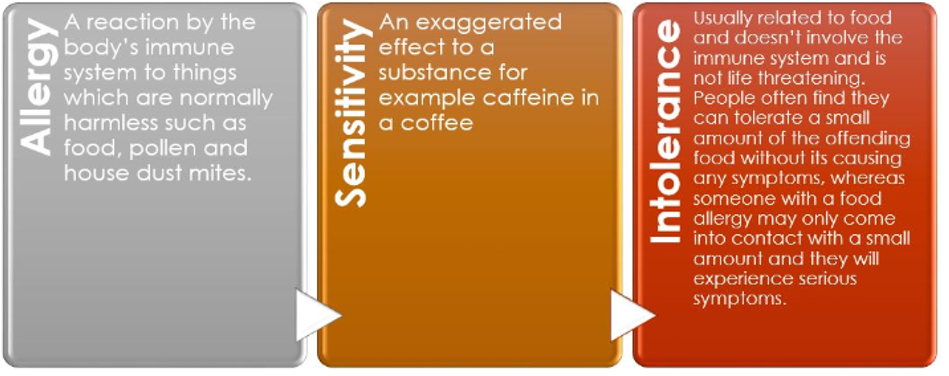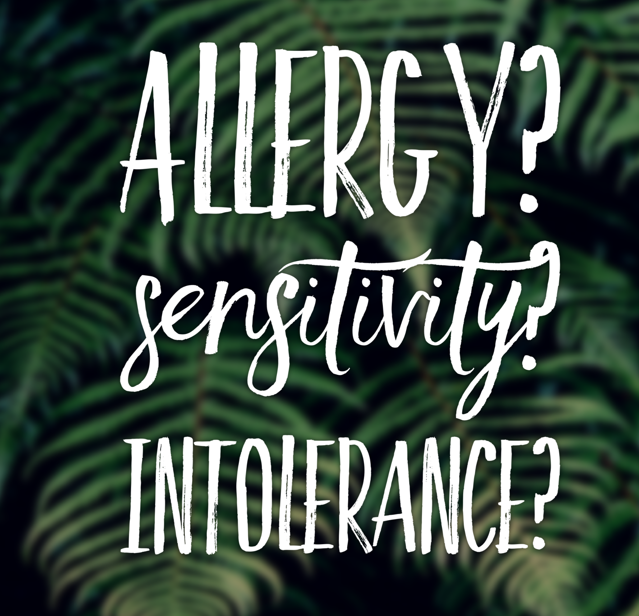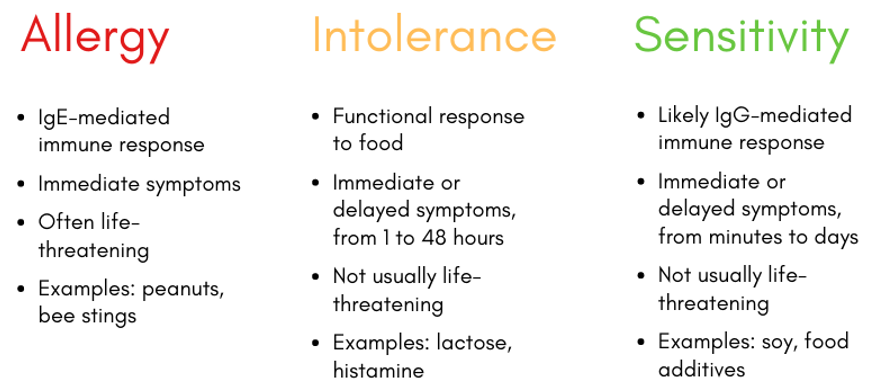Is it an allergy, sensitivity, or intolerance?
- An allergy is characterised by an immune system reaction to a substance.
- A sensitivity involves no immune response.
- An intolerance is characterized by the body lacking a chemical or enzyme needed to digest certain foods.
Often people will confuse an allergy with an intolerance or sensitivity. All, however, can be quite serious, and a range of symptoms can be caused by allergies,sensitivities, and intolerances. For this reason, it is a good idea for customers / patients to see a doctor about symptoms which appear to be linked to exposure to certain substances, to figure out precisely what is going on.
However, there are differences as shown below including:
- Allergy: Although the word "Allergy" is commonly used to describe any unpleasant reaction to a drug, food, insect sting or chemical, this can be misleading. The word should only really be used to describe a reaction produced when the body meets a normally harmless substance, which has been “remembered" from a previous exposure and subsequently produces the "IgE" antibody. In the case of an allergy, the immune system learns to attack a particular substance for an unknown reason. For an allergy to develop, someone must be exposed to the substance at least once before the allergy will manifest. A classic example of an allergy is a peanut allergy, in which the immunesystem regards peanuts as harmful and goes into overdrive when someone consumes peanuts or is exposed to peanut products. Some common symptoms linked with allergies are dermatological symptoms like eczema and hives, respiratory problems, anaphylaxis, rhinitis, and shock. These symptoms may emerge immediately, or within a few hours, depending on the type of allergy and the severity of the immune system response.
- Sensitivity: This is a reaction to a substance, which is an exaggeration of a normal side effect produced by that substance. For example, reliever inhalers used in asthma, if given at too high a dose in a particular individual may cause them to “shake". A sensitivity involves no immune system response, but it can still yield a multiplicity of symptoms, ranging from issues in the digestive tract to neurological problems. Some of the issues associated with sensitivities can become life threatening, especially if someone is exposed to a substance repeatedly, which is why it is important to be aware of sensitivities. Commonly, sensitivities manifest in the form of abstract symptoms like fatigue, weight loss, constantly runny nose, and a general feeling of being unwell, which can make it challenging to track down the offending substance.
- Intolerance: happens when unpleasant symptoms occur after eating a substance, which your body cannot handle because the digestive system does not produce enough of a particular enzyme/chemical, which is needed to break down the food and aid digestion. In the case of an intolerance, someone's body lacks the substances necessary to process something. A well-known example of intolerance is lactose intolerance, caused by a lack of the enzyme needed to digest milk. When someone with lactose intolerance consumes dairy products, the results can be quite uncomfortable and often very unpleasant, as his or her digestive system struggles to cope with the milk.
The causes of symptoms need to be correctly diagnosed so that the management and treatment for
either allergy, sensitivity or intolerance can be appropriately taken. Allergies, sensitivities, and intolerances should all be taken seriously. In some cases, there are treatments available which can help to reduce the severity of the response to something, and in some cases eliminate the response
altogether. In other instances, there may be no treatment available, in which case it is important to be outspoken to avoid exposure to the offensive substance.
Within the community pharmacy it is important to note the differences as customers can often self-diagnose and treat their symptoms without consulting anyone. Think about open questions which will help you to identify whether it is an allergy, sensitivity, or intolerance.



